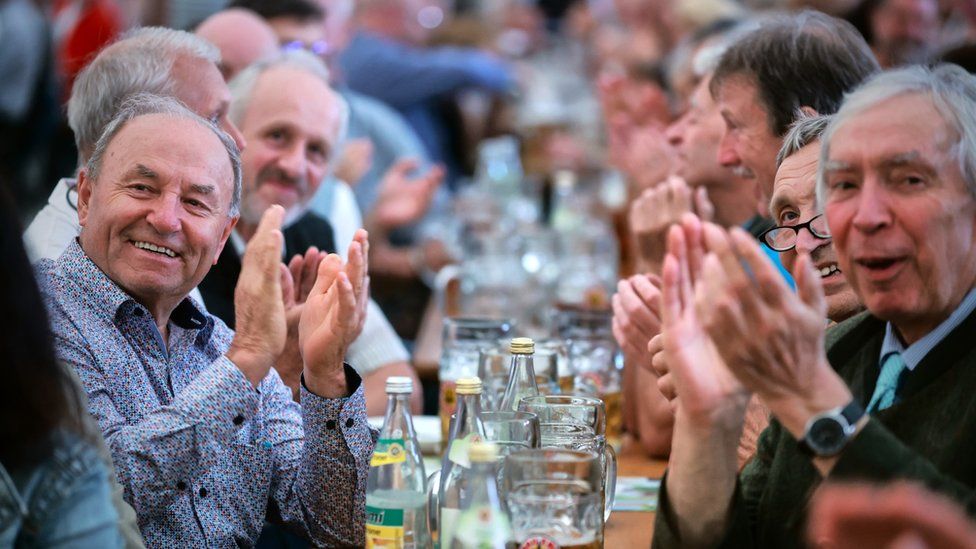Voters in Germany’s largest state, Bavaria, choose a new parliament on Sunday, after a very nasty election campaign in which populist upstarts have rattled the status quo.
The far-right AfD, tied in second place, is hoping for a big result.
Its leaders say they are being physically attacked or threatened.
But their opponents accuse them of twisting the truth for political gain, by playing into a narrative of victimisation.
Either way the debate is unusually toxic.
Days before the vote, Tino Chrupalla, the co-leader of the Alternative für Deutschland (AfD), was taken to intensive care after feeling unwell during an election rally in Bavaria.
The party describes it as a “physical attack” and AfD supporters on social media are convinced that Chrupalla was injected with a toxin.
Police are investigating, but so far say they have no evidence he was poisoned.
Mr Chrupalla is now out of hospital, but it could take another few days for the results of tests to be confirmed, during which time speculation is only growing.
In September, the AfD’s other co-leader, Alice Weidel, was taken by Swiss police from her home in Switzerland to a safe house because of security concerns. The party says there was a risk of an attack against her and her family.
A few weeks later, she delivered a speech to a rally via video link rather than in person because, according to the AfD organisers, “she wasn’t allowed out of the safe house” for her own safety.
In fact she was on holiday abroad. On the same day as the rally, she was spotted in a beach restaurant in Mallorca with her partner.

On the other side of the political spectrum, the Greens are hate figures for some right-wingers in Bavaria.
At one rally last month, a large stone was thrown at Bavarian Greens co-leader Katharina Schulze. At another event she was attending, a mock-stall was placed at the entrance selling tomatoes and stones to be thrown.
Aside from Bavaria, the wealthy western German state of Hesse is also holding parliamentary elections on Sunday, meaning that in total a quarter of German voters – some 14 million people – are eligible to vote in a crucial mid-term test for Chancellor Olaf Scholz’s government.
Bavaria was once a calm, self-satisfied region, run by the Bavarian conservative CSU almost without interruption since World War Two.
In beer tents CSU politicians traditionally campaign in local dress as they swill drinks and proudly tout the region’s remarkably successful combination of folksy traditions and high-tech economic success: Laptops and Lederhosen is the Bavarian brand.
But that brand is taking a battering. Germany has been particularly exposed to multiple crises over the past few years, including Russia’s full invasion of Ukraine.
Dire mood
The country suddenly had to pivot away from reliance on Russian energy and has taken in over a million Ukrainian refugees. At the same time, the government is trying to shift its energy-intensive economy to renewables.
Despite the gloomy predictions, this did not spark mass unemployment, the lights did not go out, and inflation never reached the heights of some other European countries.
But the mood of the country is dire.
Some local authorities are struggling with high migration numbers, and attempts by Mr Scholz’s government to introduce ambitious climate reform have been undermined by squabbles within his uncomfortable three-way coalition. A proposed fossil fuel boiler ban has sparked particular ire among Bavaria’s right-wingers.
In rallies, Hubert Aiwanger, leader of the right-wing populist Freie Wähler (Free Voters), describes the new law as anti-democratic and rails against the “elite”, despite himself being Bavarian deputy-premier and economy minister.
But it is working. Even a recent scandal embroiling him in allegations of antisemitism left him unexpectedly strengthened, after he claimed he was the victim of a witch-hunt. His poll numbers are even higher than before the scandal.

Mr Aiwanger’s blunt style – to fans straight-talking, to critics dangerous demagogy – works well in beer tents and he makes even Bavaria’s boisterous premier Markus Söder look stuffy.
In joint events, Mr Söder sometimes seems surprised that he is being outdone by another firebrand. His conservative party is also being undermined by the upstart Free Voters (FW).
The CSU looks set to win the most votes and is likely to stay in power with the FW. But a result in the mid-thirties is a far cry from the absolute majority the CSU used to win.
There is often shock that in parts of eastern Germany the AfD polls at over 30%, compared with just over 20% nationally. But in Bavaria the AfD and Free Voters together could get over 30% of the vote on Sunday, showing that hard-right populism is not simply an “east German problem”, as commentators sometimes claim.

The elections in Bavaria and Hesse are the first in a series of key votes across Germany over the next two years.
Next year, three eastern German states will hold parliamentary elections, in which the AfD currently looks set to win the most votes. European elections will also be held next year, and in 2025 Germany will choose a new federal government.
All mainstream parties are suffering in the polls, and if an election was held today Olaf Scholz’s coalition would not win a majority.
But the conservative opposition, the CSU in Bavaria and its CDU sister party in the rest of the country, is not managing to win over voters either.
The only parties doing well so far are populist insurgents. German politics looks set to get more fragmented – and even more fractious.
